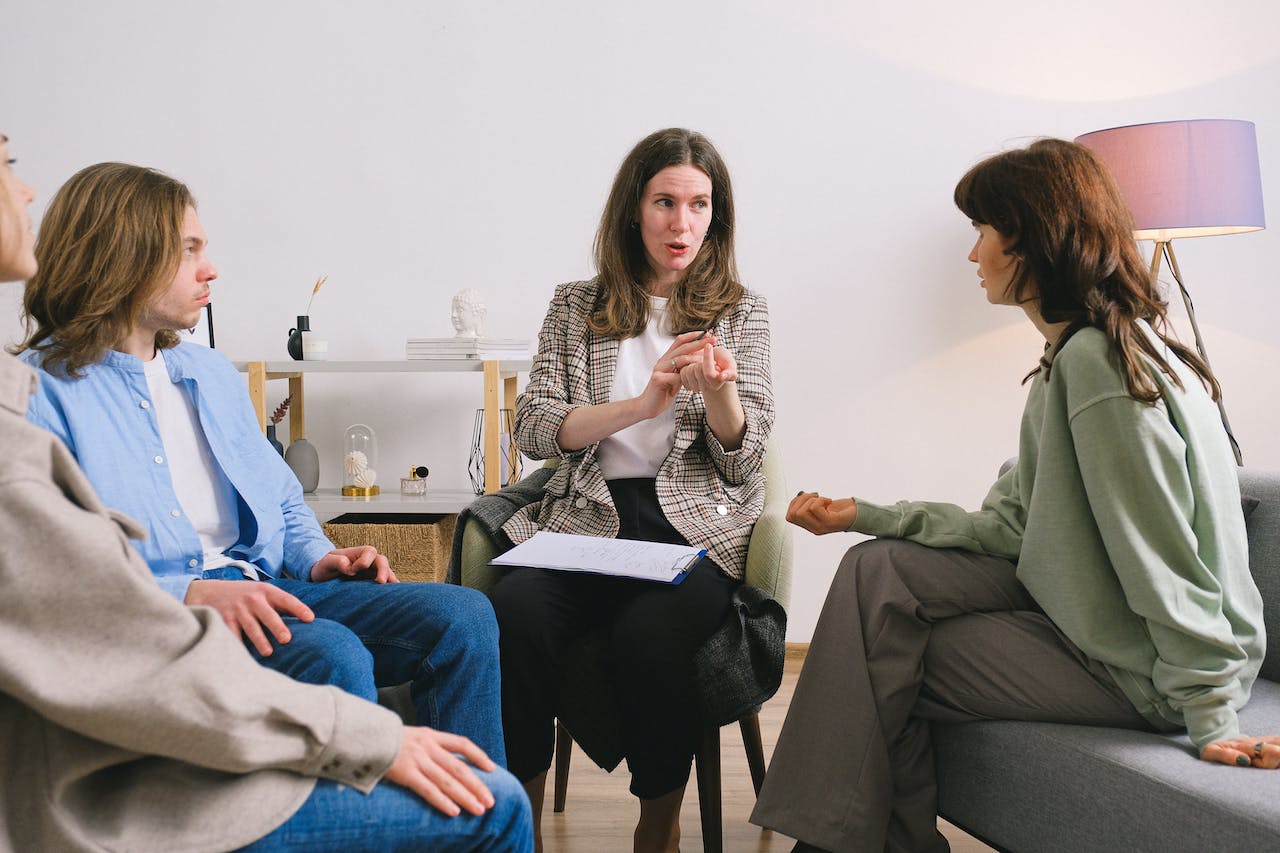Disclaimer: This post may contain affiliate links, which means I may receive a commission, at no extra cost to you, if you make a purchase through a link. Please see my full disclosure for further information. I only recommend products or services that I believe will add value to my readers. Thank you for your support! 😊
Polyamory, a relationship style where individuals have consensual, multiple romantic, or sexual relationships, is growing in visibility and acceptance.
However, like any relationship structure, it comes with its own set of challenges—especially when it comes to communication, boundaries, and emotions.
That’s where polyamory therapy comes in.
If you’re in an ethically non-monogamous (ENM) relationship and finding that things aren’t flowing as smoothly as you hoped, therapy can be a helpful tool in navigating the complexities.
Whether you’re in a long-term poly relationship, just starting out, or struggling with jealousy or insecurity, polyamory therapy can help you and your partners build healthier dynamics and deeper connections.
Therapists who specialize in polyamory therapy provide a safe space where you can work on your relationships with the guidance of a trained professional.
Polyamory therapy helps you improve communication, navigate emotions, and maintain healthy boundaries, all while honoring each person’s individual needs.
Key Takeaways
- Polyamory therapy addresses the distinct challenges faced in non-monogamous relationships.
- Effective communication and boundary-setting are crucial in navigating polyamorous dynamics.
- Specialized therapeutic support helps individuals and groups enhance their polyamorous experiences.
Why Consider Polyamory Therapy?
Being in a polyamorous relationship often means juggling multiple connections, each with its own emotional, social, and logistical needs.
Managing these relationships without guidance can lead to stress, misunderstandings, and emotional overload.
That’s why polyamory therapy can be an essential resource to help you navigate the complexities of multiple relationships in a healthier way.
Here’s why you might want to consider therapy:
Communication and Conflict Resolution
In polyamorous relationships, communication is essential.
Without clear and open communication, even the most loving relationships can falter.
Whether you’re managing multiple partners, dealing with jealousy, or setting boundaries, the ability to communicate effectively is a game-changer.
Effective communication ensures that everyone’s feelings and needs are heard, reducing misunderstandings and conflicts.
Therapy can help you develop healthier communication skills, teaching you how to express your needs and feelings clearly while also listening and understanding your partner(s).
A good therapist can guide you in navigating sensitive topics, encouraging openness and honesty in a way that feels safe and respectful.
It’s about creating a space where both sides feel understood, valued, and validated.
If there are conflicts in the relationship, therapy can guide you in resolving these challenges in a way that strengthens, rather than strains, the connection.
Conflict is inevitable in any relationship, but the goal is to approach it with a sense of empathy and understanding, avoiding escalation and hurtful behavior.
Therapists can teach you strategies for conflict resolution, helping you address issues in constructive ways that leave room for both parties to grow.
Jealousy and Insecurity
Jealousy is a common feeling in polyamory, and it doesn’t always go away on its own.
It’s natural to feel protective or insecure when your partner forms connections with others.
But when not addressed, jealousy can damage relationships, leading to resentment and distrust.
Therapy can help you explore the underlying causes of jealousy and insecurity, offering tools to manage these emotions without letting them take over your relationships.
Understanding the roots of jealousy allows you to approach it with compassion, both for yourself and your partner(s).
Therapy helps you recognize that jealousy doesn’t necessarily mean something is wrong with your relationship, but that it’s a signal to explore unmet needs, fears, or expectations.
By working through these feelings, you can learn to be more secure in your connections and overcome the fear of “losing” your partner to someone else.
Polyamory therapy gives you the space to develop healthier, more secure relationship dynamics by acknowledging and addressing these difficult emotions head-on.
The goal is not to eliminate jealousy entirely, but to reframe it as a manageable and understandable emotion, rather than something that dictates your behavior or decisions.
You’ll gain tools to separate fear from fact, allowing you to feel more grounded in your self-worth and the value of your relationships.

Boundary Setting
Every polyamorous relationship needs boundaries.
Without clear and respectful boundaries, relationships can quickly become overwhelming or unhealthy.
Boundaries can evolve and change over time, and they need to be discussed openly and often to maintain a healthy dynamic.
Polyamory therapy offers a space to explore what feels good for each partner, renegotiate boundaries as needed, and ensure that everyone’s needs are respected.
It’s crucial to recognize that no one set of boundaries is universal—what works for one person may not work for another.
Therapy helps you identify your non-negotiable boundaries, ensuring that you don’t compromise on things that are essential to your emotional well-being.
A therapist can also guide you in having difficult conversations about boundaries, teaching you how to approach these topics with empathy and understanding.
It can help you identify when boundaries are being overstepped and give you the tools to address it without shame or blame.
For example, if one partner is uncomfortable with a new relationship dynamic, therapy can help facilitate a conversation that allows both parties to express their concerns without feeling dismissed.
By working through these conversations in a supportive environment, you can create a safe and respectful space for all parties to thrive.
Relationship Dynamics and Balance
In a polyamorous setup, you may find yourself managing multiple relationships with different dynamics.
Polyamory therapy can help you find a way to balance these dynamics, ensuring that no one feels left out or neglected.
Each relationship requires time, attention, and energy.
Therapy can provide guidance on managing the emotional labor involved in multiple relationships, teaching you to prioritize self-care while maintaining healthy connections with your partners.
Sometimes, the relationships you juggle may require different levels of attention at different times.
Therapists can help you prioritize needs so that no relationship feels like it is being neglected or taken for granted.
This can be especially useful when navigating issues like time management, expectations, and the emotional needs of each relationship.
Therapy can also help you explore ways to share responsibilities in a way that feels fair to everyone involved.
This is especially important when partners have different schedules, needs, or emotional requirements.
Therapists can work with you on strategies for balancing emotional needs, such as learning when to give more space or time to one relationship without neglecting others.
Feeling Seen and Heard
When living in a polyamorous or ENM dynamic, it’s possible to feel like your feelings and experiences are misunderstood or even dismissed by those who don’t practice non-monogamy.
In many societies, monogamy is the default, and those who practice polyamory may struggle with judgment or misunderstanding from friends, family, or even colleagues.
Polyamory therapy gives you a space to be seen and heard, a space where your relationship style is understood and respected.
It allows you to unpack any unique challenges that may arise from living a non-monogamous lifestyle in a world that often prioritizes monogamy.
Whether you’re facing judgment from family or friends or feeling isolated in your relationship choices, therapy provides an affirming space to explore and validate your experiences.
Feeling supported by a therapist who recognizes and respects your lifestyle can foster self-acceptance and help you feel empowered to advocate for your relationships.
In addition to this, therapy helps you explore your identity within the context of polyamory, giving you tools to understand and communicate your choices to others who may not fully understand your lifestyle.

How Polyamory Therapy Works
Polyamory therapy can look different for each person or couple, but here are some common approaches:
Individual Therapy
If you’re struggling with feelings of jealousy, insecurity, or navigating your emotions in a poly relationship, individual therapy can be a great starting point.
A therapist can help you explore the root causes of your emotions, work through any trauma or past experiences, and develop strategies for managing them.
This allows you to gain a better understanding of yourself, your triggers, and how to approach difficult emotions in a healthy, constructive way.
You may also work on building self-esteem and emotional resilience, so that you can enter your relationships from a place of strength rather than fear or anxiety.
Through self-reflection, individual therapy helps you become more emotionally aware and capable of regulating your reactions in challenging situations.
By understanding your triggers and working through unresolved emotions, you can improve your capacity for healthy emotional expression in your relationships.
Couple’s Therapy
Couple’s therapy isn’t just for monogamous relationships!
If you’re in a polyamorous relationship, you and your partner(s) can work through relationship challenges with the help of a therapist.
Whether you’re dealing with miscommunication, unmet needs, or differing expectations, therapy can help you strengthen your bond and grow as a couple.
Therapy can help you align your relationship goals, set healthy boundaries, and resolve conflicts in a way that honors everyone involved.
The therapist’s role is to provide neutrality, making sure both parties have a chance to express their feelings without the risk of invalidation or blame.
In polyamorous relationships, it’s common for partners to have different relationship styles, which can create tension or confusion.
Couple’s therapy can help you navigate these differences and find ways to grow together, even when your individual needs diverge.
Group Therapy or Polyamory-Specific Support Groups
Some therapists offer group therapy specifically for people in polyamorous or ENM relationships.
These groups can provide a sense of community and support, where individuals can share their experiences, learn from others, and get guidance on navigating the unique challenges of polyamory.
In group therapy, you can connect with others who are going through similar challenges, sharing insights and experiences that can help you feel less isolated.
You’ll also have the opportunity to practice new skills, such as communication and boundary-setting, in a supportive environment.
Polyamory-specific support groups can be a safe space for discussing topics like jealousy, time management, and relationship dynamics without fear of judgment.
By hearing from others and offering support in return, you’ll gain valuable tools for your own journey.

Final Thoughts
Polyamory is a beautiful way to explore deep connections and meaningful relationships with multiple people.
However, it can come with its unique set of challenges.
Polyamory therapy can provide you with the tools to navigate those challenges, build healthier relationships, and address the emotions, boundaries, and needs that arise.
Whether you are struggling with jealousy, setting boundaries, or maintaining communication, therapy offers support to help you create fulfilling, sustainable relationships.
If you’re interested in therapy, find a professional who specializes in ENM relationships, and take the first step toward building a more balanced and authentic relationship with your partners.
Resources and Educational Materials
In the realm of polyamory therapy, an abundance of resources and educational materials is available to both practitioners and those navigating polyamorous relationships.
From foundational literature to specialized workshops, these tools are designed to promote understanding and competency in handling the intricacies of non-monogamous relationships.
Literature and Publications on Polyamory
- The Ethical Slut: This classic text articulates the principles and practices of non-monogamy, providing a comprehensive guide for those looking to explore polyamory.
- More Than Two: A thorough exploration of the ethical and emotional complexities of polyamorous relationships, aimed at fostering healthy dynamics.
Frequently Asked Questions
In this section, you’ll find targeted questions to help you understand the nuances of polyamory therapy and how it differs from traditional therapeutic approaches.
What are common approaches in therapy for addressing polyamorous relationships?
Therapists often explore the dynamics of polyamorous relationships by reviewing the literature and utilizing frameworks such as autophenomenology to understand individual experiences within polyamory. Learn more about these approaches through therapeutic literature on polyamory.
How can therapists create a safe and affirming space for polyamorous clients?
By honoring the diverse experiences of those in polyamorous relationships, therapists are encouraged to cultivate an environment of inclusivity and understanding. Familiarize yourself with therapist recommendations for polyamorous clients to create an affirming therapeutic space.
In what ways does couple’s therapy differ when working with polyamorous relationships?
Couple’s therapy adapts to acknowledge multiple partners and the complexities they introduce. This involves addressing unique communication needs and navigating boundaries within polyamorous frameworks. Considerations specific to polyamory in couples therapy can be understood from research like the assessment of therapist attitudes.
What should one look for in a therapist when seeking counseling for polyamorous dynamics?
Seek a therapist who is knowledgeable about polyamory, non-judgmental, and culturally competent to navigate the complexities of non-traditional relationship structures. You can find insights here to understand the importance of therapist awareness in polyamorous contexts.
How can polyamorous individuals navigate challenges unique to their relationship structure in therapy?
Therapists should help clients identify the unique benefits and challenges of polyamory, guiding them toward strategies for healthy relationship management and personal growth within their relationship structure. Resources aimed at counseling polyamorous relationships can provide effective service.
Are there any specific resources or training that therapists should have when providing therapy to polyamorous clients?
Professionals should invest in specialized training and resources that address polyamory to avoid unintentional bias and to offer informed support. Continued education and understanding of relationship diversity are key to effective therapy with polyamorous clients.

Anna is an anthropologist with a passion for Ethical Non-Monogamy (ENM) and gender and sexuality studies. Through ENM Living, she shares research-based insights and informative content to help others explore and navigate alternative relationship models. Anna is dedicated to creating an inclusive space that celebrates love in all its forms and supports those navigating the complexities of ENM.







